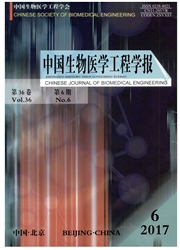

 中文摘要:
中文摘要:
探讨微囊微环境对HepG2细胞渗透压调节基因表达影响及抗渗透压物质干预效果。静电液滴法制备微囊化细胞,Real—timePcR法检测不同培养方式下钠/肌醇转运蛋白(sMIT)和牛磺酸转运蛋白(TAuT)基因表达;通过MTT法检测细胞活性、ELIsA法检测白蛋白含量,比较牛磺酸和海藻糖干预后指标变化。结果表明,不同培养方式问sMIT表达元显著差异;微囊化细胞TAuT表达增高,是平面细胞4.3倍(P〈O.01);添加l~1.5mM牛磺酸后,囊内细胞活性较对照组增加约15%~30%,白蛋白水平增加15%(P〈O.05);海藻糖虽在O.1mM时使囊内细胞活性增加20%~30%(P〈O.05),但对白蛋白分泌水平无显著影响。微囊内存在高渗应激因素诱导基因表达改变,牛磺酸和海藻糖能拮抗其对细胞的抑制作用。
 英文摘要:
英文摘要:
The aim of this work is to investigate the influence of microencapsulation on the expression of the osmoregulation genes and exogenous regulation in HepG2 cells. We compared the expression of sodium/myo- inositol cotransporter (SMIT) and taurine transporter (TAUT) in HepG2 cells under different cultured conditions through real-time RT-PCR. The effects of exogenous anti-osmotic stress matter on cell viability and albumin level were also evaluated through MTT assay and ELISA assay. We did not find a significant difference in the expression of SMIT. However, the results showed that the expression level of TAUT in encapsulated cells was approximately 4.3 times higher than that of monolayer cells (P 〈 0.01 ). Accordingly, we found that taurine at 1 - 1.5 mM significantly increased the viability by 15% - 30% and the biosynthetic function by 15% in microencapsulated HepG2 cells(P 〈 0.05). Trehalose, as for it, did not alter the biosynthetic function but increased the viability of the encapsulated cells by 20% - 30% at 0. 1 mM (P 〈 0.05). In conclusion, osmotic stress exists in the microcapsules and affects genes expression. Exogenous anti-osmotic stress matter can prevent the inhibition effects of hyper-osmotic stress on cellular growth.
 同期刊论文项目
同期刊论文项目
 同项目期刊论文
同项目期刊论文
 Perfluorooctane sulfonate mediates microglial activation and secretion of TNF-α through Ca2+-depende
Perfluorooctane sulfonate mediates microglial activation and secretion of TNF-α through Ca2+-depende 期刊信息
期刊信息
